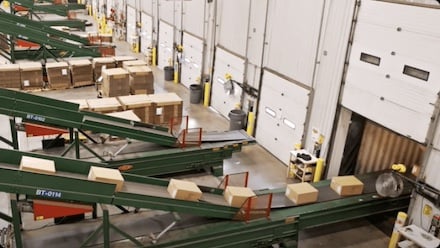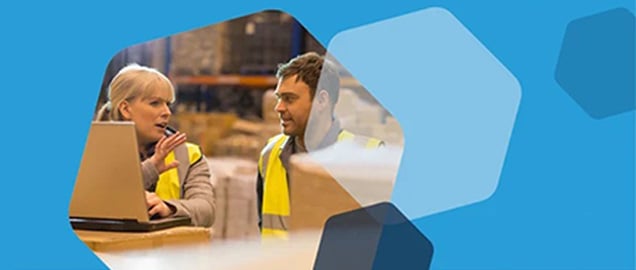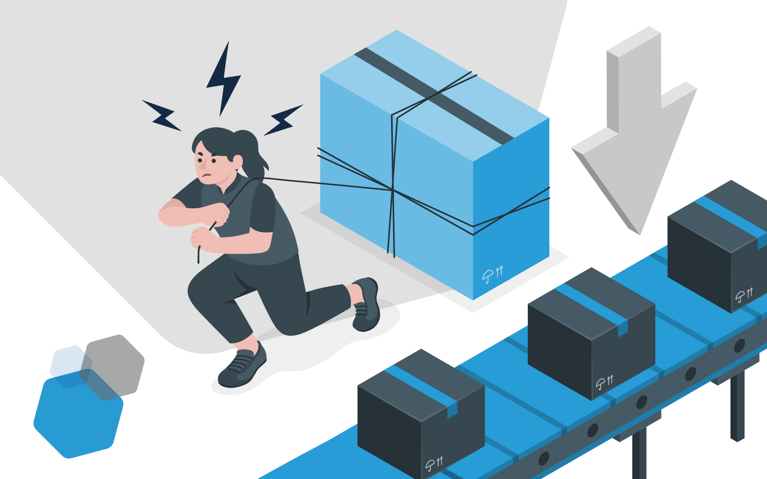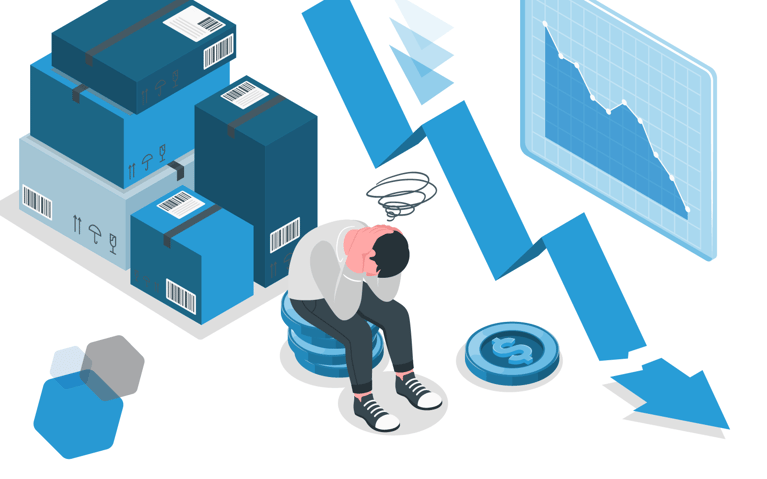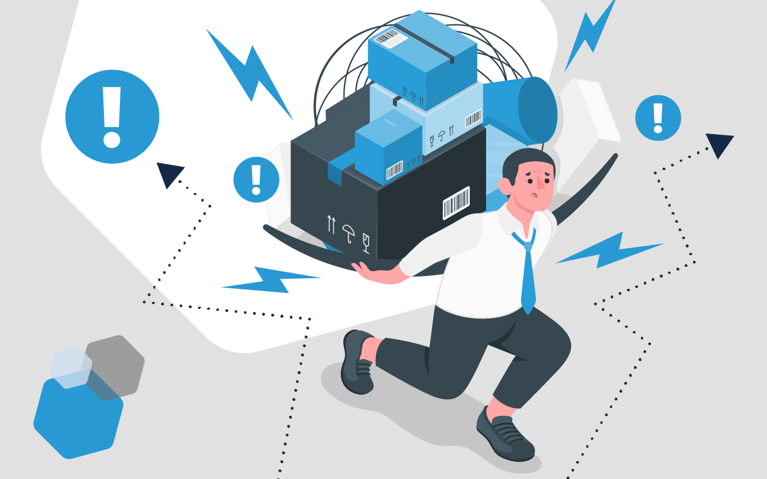Third-party logistics (3PLs) provide invaluable services for many brands. From order and inventory management to warehousing, transportation and last-mile coordination – 3PLs can handle complex fulfillment operations and let businesses focus on innovation and growth.
Additionally, fulfillment plays a more significant role in today’s customer experience. Ecommerce retailers that offer an exceptional post-purchase experience see better repurchase rates and loyalty. At the same time, research shows that 85% of online shoppers won’t reorder from an online retailer after a bad delivery experience.
In essence, your 3PL matters. So, what do you do when you’re experiencing fulfillment challenges? Here are five common 3PL frustrations and how to prevent them.
Challenge 1: Outdated technology
Outdated technology impacts 3PL operations and efficiency. The logistics industry has undergone rapid technological advancements in recent years, and when a 3PL service fails to keep pace, it leads to several fulfillment challenges.
Outdated technology hinders communication and collaboration within the supply chain. Modern 3PL operations rely heavily on integrated systems that facilitate real-time information sharing between stakeholders. Outdated technology often lacks the interoperability needed for seamless communication, leading to delays, errors and inefficiencies in the supply chain.
A lack of automation and digitization in outdated systems can increase manual intervention. This not only consumes valuable time but also increases the risk of human errors, leading to order inaccuracies, delayed deliveries and, ultimately, unsatisfied customers.
Outdated 3PL technology also disrupts a fulfillment provider’s ability to adapt to dynamic market demands. Modern logistics require agile and responsive systems that can quickly adjust to changes in consumer preferences, regulatory requirements and market trends. When there’s a lack of modern technology, you lose the flexibility needed to accommodate these changes, putting 3PL providers and brands at a competitive disadvantage.
Lastly, cybersecurity is a bigger concern with outdated technology. As technology evolves, so do the methods and sophistication of cyber threats. Outdated systems are more susceptible to security breaches, potentially compromising sensitive customer data and disrupting supply chain operations.
Challenge 2: A lack of multi-node fulfillment
While multi-node fulfillment isn’t a necessity for every ecommerce business, it’s critical for some. When brands grow and build new customer hubs, having a multi-node network is often more cost-effective and efficient. The ability to spread inventory across fulfillment centers lowers costs and can improve your ability to offer same-day, two- or three-day shipping. Multi-node networks can be a useful tool to optimize your fulfillment strategy.
Even when a brand doesn’t need a multi-node network right away, it can be a challenge and barrier to growth later on. It may also result in higher shipping costs, which can affect your customers in the end.
Challenge 3: Inability to support scaling
Flexibility is key in fulfillment – and the inability of a 3PL to scale with a brand’s business can create major challenges. 3PL services must be able to handle the peaks and valleys of your business. If they don’t, you could end up paying extra costs for warehouse space you don’t need or not being able to fulfill quickly during peak season sales, creating unhappy customers.
Ecommerce business can be unpredictable. Sales can unexpectedly shrink or surge. If your 3PL isn’t prepared to support those critical moments when you need to scale, it can impact your brand reputation and bottom line.
Challenge 4: No experience in your industry
Prana Pets requires specific storage for their product, which is temperature sensitive. Without a 3PL that can understand and manage their needs, they could end up with significant losses. But it’s more than that. Working with a 3PL that understands your industry is important for several reasons, including:
- Specialized knowledge: Different industries have unique supply chain and logistics requirements. An understanding of your industry allows a 3PL to tailor their services to meet these specific needs. This can include knowledge of regulatory compliance, industry standards and best practices.
- Efficiency and optimization: Industry-specific expertise enables a 3PL to optimize logistics processes. They can identify the most efficient routes, modes of transportation, packaging and storage solutions based on the characteristics of your industry. This can lead to cost savings and improved operational efficiency.
- Customize solutions: Understanding your industry allows a 3PL to offer customized solutions that align with your business goals. This may involve designing logistics strategies catering to your industry's unique challenges and opportunities.
- Technology integration: Different industries often require different technologies to manage and track inventory, shipments and other logistics processes. A 3PL with industry knowledge can seamlessly integrate the appropriate technologies to enhance visibility and control.
- Risk management: Industries may face distinct risks related to supply chain disruptions, compliance issues, or other challenges. A 3PL that understands your industry can proactively address these risks and implement risk management strategies to mitigate potential disruptions.
- Customer satisfaction: Industry-specific knowledge enables a 3PL to meet your customers' expectations better. They can ensure that deliveries are made on time, products are handled appropriately and customer service is aligned with industry standards.
- Adaptability to industry changes: Industries evolve, and factors such as market trends, regulations, and consumer behavior can impact logistics requirements. A 3PL with a deep understanding of your industry is better positioned to adapt to these changes and provide proactive solutions.
Challenge 5: Not able to customize
Brands stand out with memorable experiences, making it essential for ecommerce retailers to be able to personalize the post-purchase experience. If a 3Pl doesn’t support branded packaging or special touches that amplify the unboxing experience, it can impact your ability to create an exceptional customer experience.
Today’s packaging can be a differentiator that separates you from the competition. This means you need a 3PL that can support customizability.
The right 3PL prevents challenges
Choosing the right 3PL partner is the best way to prevent challenges. Often, there are signs it’s time to upgrade your 3PL, including experiences the challenges we’ve laid out. Look for a 3PL that has the technology – including OMS/WMS systems – to manage your unique fulfillment and logistics operations. Ensure they are transparent and committed to your satisfaction.
Subscribe to our emails for the latest industry insights!
By entering your email, you agree to receive marketing emails from Cart.com

